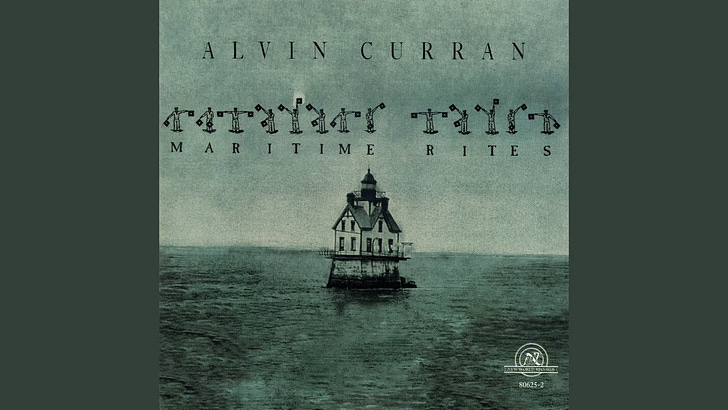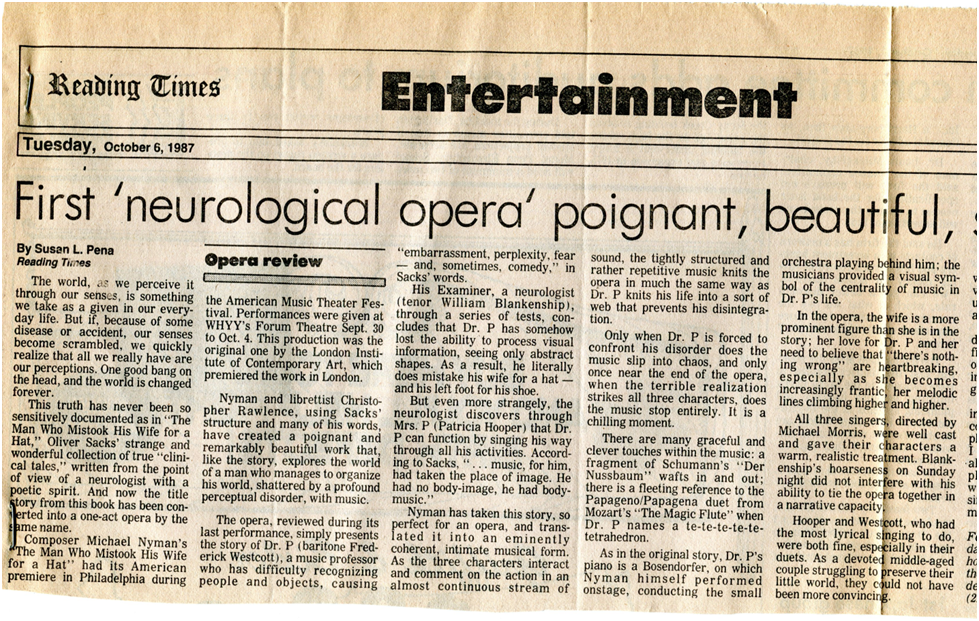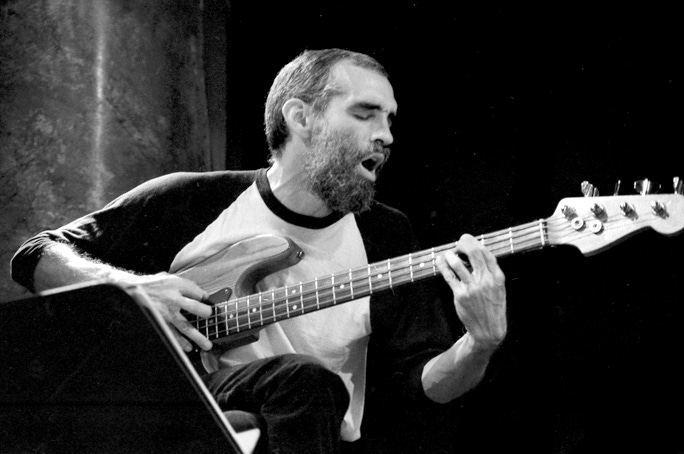October 4, 1950 Steve Swallow // 1987 NMA Philadelphia day 3/10
Alvin Curran, Relâche, Temple University Orch, Guy Klucevsek, Henry Cowell, Alvin Lucier, Melinda Wagner, John Bergamo, Ron George, Michael Nyman, Hannibal Lokumbe Peterson and the Sunrise Orch
Alvin Curran, Alvin The Maritime Rites
(rescheduled from October 3 due to weather conditions)
Temple University Orchestra with Guy Klucevsek
Henry Cowell: Concerto Brevis
Temple University Orchestra
Alvin Lucier: Kettles
Melinda Wagner: Passages
John Bergamo: Gupta Solka Chanda
Ron George: Improv on a Crooked Nose
American Theatre Company
Michael Nyman: The Man Who Mistook His Wife For A Hat
Peterson, Hannibal Marvin and the Sunrise Orchestra
Cecil McBee, Ron Burton, Alan Nelson and David Murray
Free Nelson Mandela Suite,
includes Duke Ellington: In a Sentimental Mood
======================================================
Alvin Curran, with Relâche: The Maritime Rites
(rescheduled from October 3 due to weather conditions)
From the recorded version featuring Malcolm Goldstein:
Joseph Franklin from Scribing Sound (link to the book at the end of this post):
At one time I was standing on the bow of a weathered tugboat while it motored down-river into increasingly choppier swells, I peered into a dark gray sky sporadically illuminated with splotches of yellow light, the afterglow of lightning streaks in the distance, thunder claps rolling off echoing towards the farmlands of South Jersey. To my right was Philadelphia's distinctive skyline looming over the Port of Philadelphia.
Once the single largest fresh-water port in North America, the Philadelphia riverfront was quiet these days except for commercial development to house and entertain those urban warriors who can afford to spend $4,000 each month for a "room with a riverfront view" or dine at reasonably good restaurants at unreasonably high prices. To my left the New Jersey shore of the Delaware River held, in its muddy grip, the City of Camden, one of America's most blighted and inefficient cities. My view that day of Camden was of the newly minted Walt Whitman Park which skirted the riverfront, a pedestrian walk leading to a construction site of the future New Jersey Aquarium. Positioned at equal distances along each shore were eight large ship's horns facing one another across the murky Delaware River like ancient sentinels watching over the ghosts of a once proud bustling riverscape. That day the river was not happy; movement on board the tugboat confirmed it.
As the tugboat bobbed and pitched in the water the boat's captain-pilot assured me the storm would probably pass. If we waited an hour or so, he said, the skies would clear so Alvin Curran's piece titled Maritime Rites could begin. I spoke by radio with associates on both sides of the river; some suggested we wait out the storm, while others lobbied hard that we postpone it. The composer, Alvin Curran, was among those who wanted to wait it out. I however was not at all comfortable with the current conditions.
I had heard over the radio that the storm would arrive in about an hour and the rain would be constant and fairly severe. The next day, Sunday, would be clear and sunny. If we waited and attempted to perform the piece there was a possibility of heavy rain and lightning damaging the equipment on shore, not to mention putting all the performers and technical personnel at risk. Clearly I leaned towards postponing the performance. If we did postpone it we would likely lose the coverage by radio and television station waiting on shore for the performance. And the tugboat captain-pilot informed me we might lose some of the participating ships docked in and around the harbor.
The situation was resolved when the festival's production coordinator David-Michael Kenney called on the phone with a reminder that should
231
anything go wrong with the festival was liable for damages. Although Relâche had adequate insurance coverage it was not worth the risk. I informed everyone that we would postpone the performance until the next day at Noon.
Sunday, October 4th was one of those golden early fall days with temperatures in the mid-50s and a cool wind skimming over the Delaware River. Finally, Alvin Curran's Maritime Rites was about to launch. And with it the unofficial opening of New Music America '87.
Composer and performer of instrumental, electronic and environmental music, Alvin Curran has created a number of Maritime Rites on riverways throughout Europe and the United States, including a gorgeous realization along the Chesapeake Bay in nearby Delaware and Maryland. After hearing that version I arranged with the Philadelphia Maritime Museum to co-commission a similar work from Alvin to celebrate the historic Port of Philadelphia and serve as the opening work for New Music America '87 - Philadelphia.
The Maritime Rites, as described by Alvin in the festival catalogue: "... 8-12 ships' foghorns are installed at strategic locations on the Philadelphia and Camden sides of the Delaware River at Penn's Landnig within a one-mile area. These horns are pitched and activated by musicians reading from a score and a computer program activated by the composer. The tones generated by these horns sustain for relatively long durations, mixing one another to create a rich musical texture. Simultaneously three barges with small groups of musicians tack back and forth across the Delaware River their amplified sounds interacting with the ships' horns to fill the river and the shore."
As the piece unfolded against a cloudless sunny sky each of the ships' horns sounded their distinctive tone cluster on cue from Alvin while one barge of brass players floated up and down the river performing a selection of tunes with maritime themes. In addition to the eight ships' horns the tugboat and four other ships that were in port that day eagerly agreed to sound their horns on cue, adding to the mix.
I probably had the best seat of anyone. From the bow of the tugboat I surveyed the entire scene, listening to the sounds blending and weaving in and around one another as the random harmonies rippled along with the River's current as it flowed south towards the Atlantic Ocean. At the conclusion of the piece, as the sound of the ships' horns decayed, the barge carrying the brass players floated by one last time playing My Bonny Lies Over The Ocean. It was a perfect ending for the piece
232
and a perfect beginning for the festival. As the tugboat pulled into its slip on the Philadelphia side of the river I saw Alvin surrounded by a crowd of observers congratulating him, like a ballplayer who had just hit a game-winning home run. He had.
*
Foghorns groaned and trombones echoed for nearly an hour yesterday as Alvin Curran's Maritime Rites floated on the Delaware River. The Dada-esque extravaganza, presented by the New Music America Festival, had been scheduled for Saturday, when rain washed it out.
It was hard to tell how many people at Penn's Landing were aware that music was going on on the water - but about 100 seated on the pier seemed to enjoy the random bellowing of foghorns fixed to both shores, staring with interest as two barges pulled by tugs tacked back and forth sputtering sound.
Together, the barges contained 13 brass players, a synthesizer, countless amplifiers and two conductors - the musicians busily engaged in providing long-sustained tones that either clashed between the vessels or sounded eerily cacophonous against the foghorns. Once a brass choir played what sounded like a drunken chorale, another time My Bonnie Lies Over the Ocean.
But the amplification did not always work and often the foghorns were silent, making it hard to hear anything.
More players and more foghorns might have resulted in a concert more musically compelling, but "this event cost only $16,000," a one festival official pointed out, compared with Curran foghorn-rites in Berlin recently that cost $40,000.
Still, hurling sounds across the water can be fun. Curran, an American who lives in Rome, isn't solely into Christo-like sonic wrappings, either; he has composed for the concert hall.
- Lesley Valdes (with contributions by Daniel Webster), "New-music fete floats a concert", Philadelphia Inquirer, October 5, 1987
*
I’ve included a link to the post from the NMA 1982 Chicago Festival of July 8, when The Maritime Rites was performed there at the end of this post.
♪
Temple University Orchestra with Guy Klucevsek
Henry Cowell: Concerto Brevis (world premiere)
Awww, Susan Pena quoted me!
Henry Cowell's Concerto Brevis, composed in 1960 for accordion and orchestra, was given its world premiere by Relâche's accordionist, Guy Klucevsek, and the Temple Symphony.
Georges Dupuis, a visitor from Canada, aptly dubbed the piece "avant-garde easy listening."
From its hymnlike first movement to the final fifth movement with its dizzying cadenza for the accordion, "Concerto Brevis" is reminiscent of Vaughn Williams in its lush, stringy timbres and catchy, folklike melodies.
Klucevsek was able to exhibit his phenomenal technique - especially a meltingly legato right hand - throughout the work, which included Irish jigs, blues, and toccatalike sections.
- Susan L. Pena, Redding Eagle-Times, “New Music Sounds Off in Old Philadelphia”, October 9, 1987
*
Further perspective was provided by music from America's heroic, ultramodern period. … Guy Klucevsek gave Henry Cowell's accordion concerto a dashing world premiere.
- Kyle Gann, "Quiet Heroics", Village Voice, November 10, 1987
*
The Temple University Orchestra took the stage for the premiere of Henry Cowell's Concerto Brevis for accordion. Guy Klucevsek, the soloist, made a strong case for the piece, which was written as a way to review Cowell's stylistic manner. Cowell used the accordion's color rather than projection to make his music.
- Lesley Valdes (with contributions by Daniel Webster), "New-music fete (sic) floats a concert", Philadelphia Inquirer, October 5, 1987
♪
Unidentified version on youtube:
♪
Temple University Orchestra
Alvin Lucier: Kettles
…the concert I attended on Sunday afternoon at the Port of History Museum was of the conventional kind, although it was certainly innovative in the use of instruments. The concert featured the Temple University Percussion Ensemble and the Temple University Symphony Orchestra in a program that included three premieres.
The first of these, Kettles, by Alvin Lucier, used five timpani of various sizes and pitches interacting with two pure wave oscillators.
While the concept was certainly interesting - an exploration of the manner in which the instruments and electronic sounds affect each other - it was difficult to hear exactly what was going on. As a reult, the piece was not as successful as one might have wished.
The electronic background set up a sort of low buzzing in the ears, while the timpani, in their skewed syncopation, created an atmosphere that was vaguely disturbing and ominous, like distant cannon. The entire work never reached a volume louder than mezzo-piano.
- Susan L. Pena, Redding Eagle-Times, “New Music Sounds Off in Old Philadelphia”, October 9, 1987
*
Five timpanists from Temple played Alvin Lucier's Kettles, music written to test sound-wave collissions. Notes played against electronically generated sound waves created the wobbles and flutters that constituted the focus of the piece.
- Lesley Valdes (with contributions by Daniel Webster), "New-music fete floats a concert", Philadelphia Inquirer, October 5, 1987
♪
Melinda Wagner: Passages
Melinda Wagner's Passages (composed in 1985) concluded the program on a highly dramatic throwback to late Romanticism. Her huge climaxes and building chromaticism, with heavy orchestration, souded at times like Richard Strauss, at other times like Schoenberg or Webern. It was as far from the first piece on the program in concept and mood as ultraviolet is from infrared.
- Susan L. Pena, Redding Eagle-Times, “New Music Sounds Off in Old Philadelphia”, October 9, 1987
Relâche did its civic duty by programming local profs George Crumb and Richard Wernick plus a piece by younger academic Melinda Wagner that sounded like the Reader's Digest version of Berg's Three Pieces for Orchestra. The audiences for these works cheered lustily and left at intermission, and Wernick later conceded that Crumb is the country's most oft-performed composer.
- Kyle Gann, "Quiet Heroics", Village Voice, November 10, 1987
♪
John Bergamo: Gupta Solka Chanda
The percussion portion of the concert ended with "Gupta Sloka Chanda," written and conducted by John Bergamo, and featuring George on tablas and ballad console with five marimbas accompanying him.
Based on North Indian music, the piece was in three movements. Most interesting was the second movement, during which the musicians created strange effects by bowing the marimbas.
The result was a background of musical sighing against which George built sound textures from his collection of gongs.
- Susan L. Pena, Redding Eagle-Times, “New Music Sounds Off in Old Philadelphia”, October 9, 1987
*
Bergamo's piece, with [Ron] George playing tabla while five percussionists from Temple University developed shimmering sounds from marimbas and vibraphones, had the same inner serenity wrapped in motionless sonic atmospheres.
- Lesley Valdes (with contributions by Daniel Webster), "New-music fete floats a concert", Philadelphia Inquirer, October 5, 1987
♪
A recorded version from 2008 which seems to have dropped an “a” in the spelling…
♪
Ron George: Improv on a Crooked Nose
Ron George, a percussionist from the California Institute of the Arts and Namaste Fine Arts School, played "Improv on a Crooked Nose," another premiere, on the ballad console (a collection of every conceivable kind of chime and gong, with a three-level marimba in the center).
Building with a clang and a quiet shimmer, George slowly and deliberately built his improvisation, with sounds both tremulous and grand gradually overlapping
As the piece gained complexity, he created a sort of cage of vibrant tintinnabulation around himself, later opening it and allowing the sound to pour slowly away to a final fading gong.
- Susan L. Pena, Redding Eagle-Times, “New Music Sounds Off in Old Philadelphia”, October 9, 1987
*
Ron George, a California composer and percussionist, offered one of his own works from amid a jungle gym of chiming instruments, then performed a solo in John Bergamo's Gupta Sloka Chanda.
The George piece probed for the beauty within metallic instruments, finding softly chiming resonances that sustained an atmosphere of mystery.
- Lesley Valdes (with contributions by Daniel Webster), "New-music fete floats a concert", Philadelphia Inquirer, October 5, 1987
================================
American Theatre Company
Michael Nyman: The Man Who Mistook His Wife For A Hat
(not officially a part of the NMA festival but I went and loved it and remember, Nyman was a NMA original from 1979! - gd)
…The set design, by Jock Scott, was a microcosm in which slides, video and lighting were cleverly used to enhance the minimal action.
This is an opera that certainly deserves to be repeated. As the first "neurological opera," it not only explores the part music plays in our lives, but confronts the fragility of our separate worlds.
However, because of its intimacy - its language is too complex and its scope too small to play well in a large opera house - I am afraid that it might suffer the all-too-common fate of one-act plays, that of obscurity. This would be unfortunate indeed, since Nyman has created a small masterpiece.
gd note - Nyman did however get to translate it for television! The full work is here:
=================================================================
Hannibal (Marvin Peterson) Lokumbe and the Sunrise Orchestra
Cecil McBee, Ron Burton, Alan Nelson and David Murray
Free Nelson Mandela Suite,
includes Duke Ellington: In a Sentimental Mood
Actual performance recording (all 10 parts):
https://archive.org/details/NMA_1987_10_04_c1
Francis Davis’s review from the Philadelphia Inquirer:
Other Music notes about the performance:
The third concert of the 1987 Festival featured an extended set by jazz trumpeter and composer Hannibal Marvin Peterson (a.k.a. Hannibal Lokumbe), and his Sunrise Orchestra, which included bassist Cecil McBee, pianist, Ron Burton, drummer Alan Nelson, and special guest, saxophonist David Murray. While not necessarily sharing the same avant-garde sensibility of other Festival acts, the talent of this jazz quartet is never in doubt, as they perform a selection of compositions by Peterson and others, some of which were previously released on single compositions, but for the purposes of this concert are presented as parts of a longer "Free Nelson Mandela Suite." Although, thus apparently a work in progress, with little more than a few shout outs from the stage to "free Mandela" and a poem about the antiapartheid struggle read by Naomi Nelson to tie it to the great South African leader in the minds of the casual listener, the performance is strong throughout and includes numerous memorable solos by both Murray and Peterson. These include a cover of Duke Ellington's In a Sentimental Mood, which while mysterious as to its connection with Mandela, nevertheless stands as a wonderful mid-set interlude,
=========================================================
New Music America Birthday:
Steve Swallow, 1940, Fair Lawn, New Jersey
https://en.wikipedia.org/wiki/Steve_Swallow
Well established in the jazz world, Steve Swallow appeared once at New Music America (unless he took in concerts as a witness like the rest of us), at the 1985 festival with Carla Bley in her mini-opera Under the Volcano (for Malcolm Lowry); more on that performance when I do the Los Angeles festival dailies in November.
===================================================================
Links to more stuff here about Alvin Curran’s Maritime Rites, and this post also includes to the place on his own website where he has many photos of the many different places around the world where it’s been performed:
July 8, 1982 Chicago day 4 / NMA birthdays Percy Grainger, Ge Gan-Ru
Percy Grainger, American citizen from 1918 on and a big Grieg fan… Library of Congress photo ========================= Percy Grainger - 100th birthday concert - hosted by Charles Amirkhanian Kirk Nurock - Natural Sound Ensemble interactive critters performance
===================================================================
Joseph Franklin’s book about his career in music is available here:













